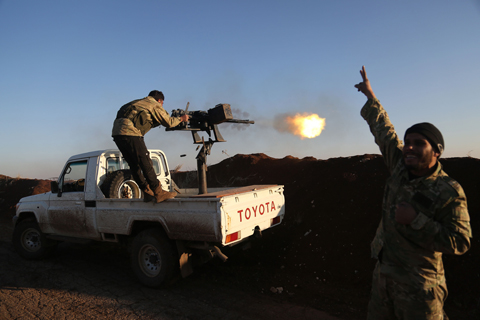 TALL MALID, Syria: Turkish-backed fighters from the Free Syrian Army fire towards Kurdish People's Protection Units (YPG) positions in the village of Um Al-Hosh in the area of Afrin yesterday. – AFP
TALL MALID, Syria: Turkish-backed fighters from the Free Syrian Army fire towards Kurdish People's Protection Units (YPG) positions in the village of Um Al-Hosh in the area of Afrin yesterday. – AFPHASSA, Turkey: Turkey yesterday launched a new air and ground operation to oust a Kurdish militia from its northern Syrian enclave, defying US warnings that the action risked further destabilizing the area after almost seven years of civil war. President Recep Tayyip Erdogan had repeatedly vowed that Turkey would root out the “nests of terror” in Syria of the People’s Protection Units (YPG) militia which Turkey deems a terror organization.
The launch came despite warnings that the operation could be militarily tough against an already battle-hardened foe and complicate relations with both Washington and Moscow. The foreign ministry of Russia, whose opinion is seen as crucial in determining how far the operation goes, said it had received the news of the campaign with concern and urged restraint. Turkey’s army said operation “Olive Branch” began at 1400 GMT and was aimed at the YPG and Islamic State (IS) militants. Among the targets in hit in air and artillery strikes was the YPG-held Minnigh military airport, which lies north of Aleppo, the state-run Anadolu news agency said. It said 108 targets were hit, with the casualties all Kurdish militants.
An AFP correspondent on the Turkish side of the border saw two war planes launch air strikes inside Syrian territory, sending huge white plumes of smoke up into the early evening sky. Units of pro-Ankara rebels known by Turkey as the Free Syrian Army (FSA) also began moving into the Afrin area of Syria which is controlled by the YPG, Anadolu said. There were no initial reports of Turkish ground troops crossing the border. Erdogan said that after Afrin, the forces would also seek to oust the YPG from Manbij, a town to the east that the Kurdish militia also holds.
In a delicate diplomatic situation, the top diplomats of Russia, Iran and the United States in Ankara were invited to the foreign ministry to receive a briefing on the operation, the ministry said. Foreign Minister Mevlut Cavusoglu held telephone talks with US counterpart Rex Tillerson while Turkey’s top general Hulusi Akar informed his American and Russian counterparts. Russia said its Foreign Minister Sergei Lavrov also held talks with Tillerson.
Turkey accuses the YPG of being the Syrian offshoot of the Kurdistan Workers’ Party (PKK) which has waged a rebellion in the Turkish southeast for more than three decades and is regarded as a terror group by Ankara and its Western allies. But the YPG has been the key ally of Turkey’s fellow NATO member the United States in the fight against IS militants, playing a key role in pushing the extremists out of their Syrian strongholds.
A senior US State Department official said on Friday that Washington did not believe “a military operation... serves the cause of regional stability.” Erdogan had reacted furiously this week to an announcement of plans to create a US-backed 30,000-strong border security force in northern Syria composed partly of YPG fighters, describing it as an “army of terror”. Tillerson later said the “entire situation has been mis-portrayed, mis-described”, admitting “we owe them (Turkey) an explanation. “We don’t care what they say,” Erdogan spat back. “They will learn how wrong it is to trust a terror organization.”
Syria’s Deputy Foreign Minister Faisal Mekdad had also warned on Thursday that the Syrian air force could destroy any Turkish warplanes used in the new offensive. But Cavusoglu told the 24 TV broadcaster that Turkey was informing Damascus in writing about its operations, in a rare contact between two governments who have been at odds since the civil war began. Turkey from Aug 2016 to March 2017 pushed into Syria in its more than half-year Euphrates Shield operation in an area to the east of Afrin against both YPG and IS.
Analysts say that crucial for any major new ground operation will be approval from Moscow which has a military presence in the area and a cordial relationship with the YPG. Russia is an ally of the Assad regime which Turkey has opposed since the onset of the war. But both Ankara and Moscow, as well as Tehran, have worked closely on a peace process in the last year. “Moscow is concerned at this news. We call on the opposing parties to show restraint,” the Russian foreign ministry said. But the Russian defense ministry said its troops were withdrawing from the Afrin area to prevent any “provocation” and ensure the security of its troops.
With conspicuous timing, Akar and Turkey’s spy chief Hakan Fidan were in Moscow on Thursday for talks on Syria. “A full Turkish air and ground offensive will not take place without Moscow’s blessing,” said Anthony Skinner, director MENA at global risk consultancy Verisk Maplecroft. The Syrian Democratic Forces (SDF), an umbrella grouping composed mainly of YPG, said in a statement the Turkish operation threatened to “breathe new life” into IS and said it has “no choice but to defend ourselves and our people”. – AFP










